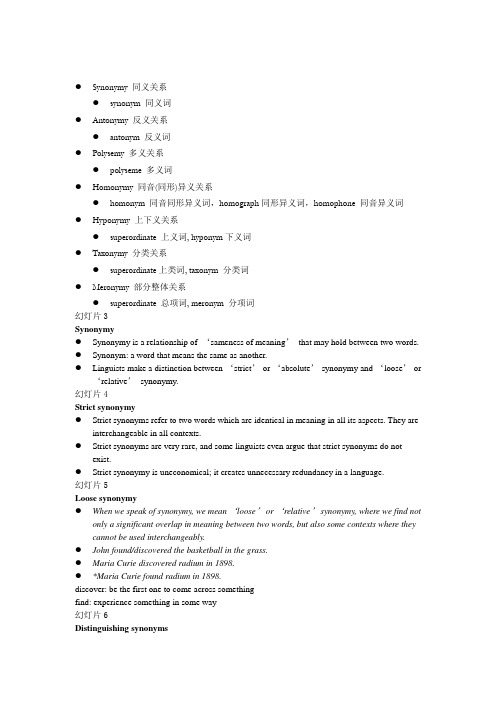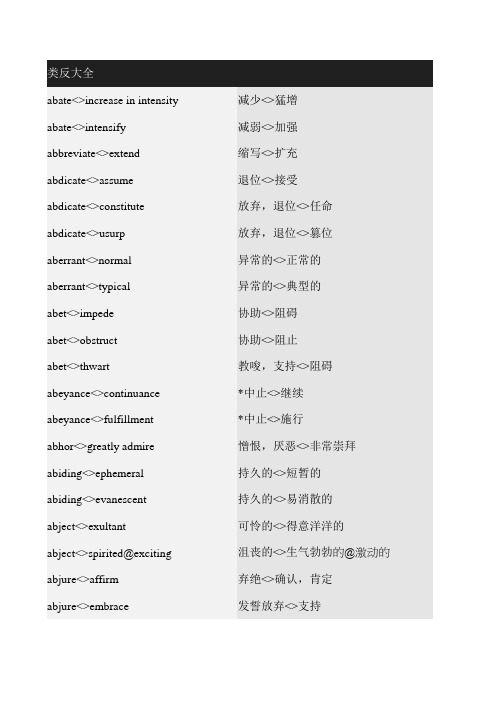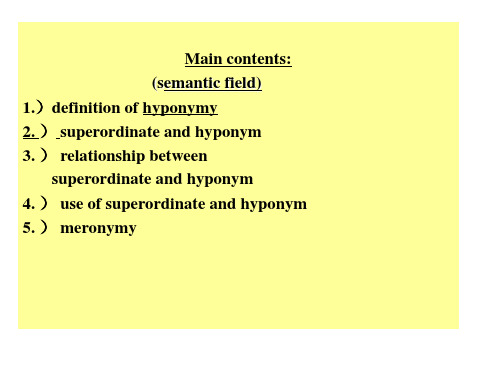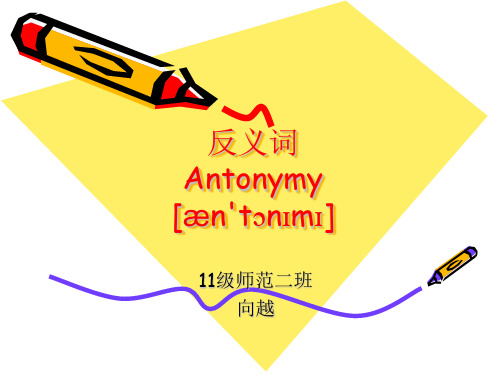词汇学 反义关系精编版
第五讲 反义关系

3.反义词的功能 3.反义词的功能 反义词既相互对立,又彼此依存,经常连用在特定 的结构中,借以凸显语义中的区别特征: 1)用在“не X,а Y”,“X ,а Y”等结构中,表示 )用在“не Y”,“X Y”等结构中,表示 对别意义,如: Ей казалось, что это не веселая песня, а очень грустная.(М.Горький) Взять у нас тебе нечего, а дать ты нам ничего не можешь.(Ф.Глад от X до Y”, “с 4)用在 Y”,“ Y”, X,доY”等结构中,表示穷尽的意义,如: доY”等结构中,表示穷尽的意义,如: И верхние, и нижние—Все ноты нижние— хорошие! (Н.Некрасов) Сделав над собой усилие, Синцов добросовестно повторил все от начала до конца.(К.Симонов)
4)“对照”和“矛盾”的修辞格 对照法(антитеза)把两种相互对立的事物,或 对照法(антитеза)把两种相互对立的事物,或 同一事物的两个对立方面,在呈对偶关系的结构 中并举出来加以比较,形成映衬,以增强表现力 和美学效果,如: Тянулась жизнь—как и у всех,—богатая жизнь— всех,— длинными горестями и бедная короткими радостями.(М.Шолохов) Голова Ивана Ивановича похожа на редьку хвостом вниз; голова Ивана Никифоровича— Никифоровича— на редьку хвостом вверх.(Н.В.Гоголь)
英语词汇学_Unit_06_Sense_relations

●Synonymy 同义关系●synonym 同义词●Antonymy 反义关系●antonym 反义词●Polysemy 多义关系●polyseme 多义词●Homonymy 同音(同形)异义关系●homonym 同音同形异义词,homograph同形异义词,homophone 同音异义词●Hyponymy 上下义关系●superordinate 上义词, hyponym下义词●Taxonymy 分类关系●superordinate上类词, taxonym 分类词●Meronymy 部分整体关系●superordinate 总项词, meronym 分项词幻灯片3Synonymy●Synonymy is a relationship of ‘sameness of meaning’that may hold between two words.●Synonym: a word that means the same as another.●Linguists make a distinction between ‘strict’or ‘absolute’synonymy and ‘loose’or‘relative’synonymy.幻灯片4Strict synonymy●Strict synonyms refer to two words which are identical in meaning in all its aspects. They areinterchangeable in all contexts.●Strict synonyms are very rare, and some linguists even argue that strict synonyms do notexist.●Strict synonymy is uneconomical; it creates unnecessary redundancy in a language.幻灯片5Loose synonymy●When we speak of synonymy, we mean ‘loose’or ‘relative’synonymy, where we find notonly a significant overlap in meaning between two words, but also some contexts where they cannot be used interchangeably.●John found/discovered the basketball in the grass.●Maria Curie discovered radium in 1898.●*Maria Curie found radium in 1898.discover: be the first one to come across somethingfind: experience something in some way幻灯片6Distinguishing synonyms●We often take the following things into consideration when we try to find the differencesbetween synonyms.●Different English dialects●Different stylistic meanings●Different connotative meanings幻灯片7Synonyms from different dialects●Some synonym pairs differ in that they belong to different dialects of English. Here are someexamples of synonyms from British and American English:BrE AmE BrE AmElift elevator farm ranchlawyer attorney biscuit cookierubbish garbage pavement sidewalk幻灯片8Synonyms with different stylistic meanings●One of a pair of synonyms may be used in a more formal context than the other. Here aresome examples of synonym pairs.Informal Formal Informal Formaldie decease daddy fatherblame chide guy manwest occidental praise eulogy幻灯片9Synonyms with different connotative meanings●Synonyms may have different emotive associations (connotative meanings).famous notorious(disreputably) misuse abuse(of privilege orpower)ambiguous equivocal(deliberately) new novel(strikingly)hate loathe(with disgust) obtain procure(with effort)幻灯片10Source of synonyms●Why are there so many synonyms in English?●The primary reason for this has to do with the heavy borrowing from other languages,especially from French and Latin.English French Latinask question interrogatetime age epochbegin commencebuy purchase幻灯片11Antonymy (反义关系)●Antonymy is a relationship of ‘meaning opposition’ that may hold between twowords.●Antonyms can be defined as words which are opposite in meaning.●Major types of antonyms:●Gradable antonyms●Contradictory or complementary antonyms●Converse antonyms幻灯片12Gradable antonyms●Gradable antonyms include pairs like the following:●beautiful ugly●expensive cheap●fast slow●hot cold●long short●rich poor●wide narrowThese pairs are called gradable antonyms because they do not represent a more/less relation. The words can be the end-points of a continuum (连续体).Since they are gradable, they allow comparison.幻灯片13Contradictory (complementary) antonyms●Contradictory antonyms include pairs like the following:●asleep awake●dead alive●on off●remember forget●win lose●true falseThese pairs are called contradictory antonyms because they represent an either/or relation.If you permit some behavior, then it is not forbidden.Since they are not gradable, they do not allow comparison.幻灯片14Converse antonyms (逆行)●The following are examples of converse antonyms:●lend borrow●husband wife●above below●before after●behind in front of●buy sell●give receive●parent child●speak listenLend is the converse of borrow and vice versa; i.e. the substitution of one member for the other does not change the meaning of a sentence if it is accompanied by the change of subject and object.John lent Mary five dollars.=Mary borrowed five dollars from John.幻灯片15Contradictory antonyms vs. Converse antonyms1,The bridge is above the river.The river is below the bridge. Converse antonyms are relational antonyms.2,This behavior is allowed.This behavior is not prohibited. Contradictory antonyms are either/or antonyms.幻灯片16Polysemy●When a word is first coined, it is always the case (true) that it has only one meaning(monosemic). But in the course of development, the same symbol may be used to express new meanings. The result is polysemy.●Polysemy shows the economy and efficiency of human languages.幻灯片17Two processes leading to polysemy●There are two important processes in the development of meaning:●Radiation (发散)●Concatenation(串联)幻灯片18Radiation●Radiation is a process in which the primary meaning stands in the center, and the derivedmeanings radiate from it in every direction like rays.●All the derived meanings can be traced back to the primary meaning.幻灯片19Radiation Example: faceWe can get the derived meanings by extension, narrowing, analogy, transfer, etc.the front of the head(Primary Meaning): 1a person,2self-respect,3outward appearance,4the surface of a thing,5countenance(Derived Meaning)幻灯片20Concatenation●Concatenation is a process in which the meaning of a word moves gradually from its primarymeaning by successive shifts, like the links of a chain, until there is no connection between the meaning that is finally developed and the primary meaning.●Unlike radiation where each of the derived meaning is directly related to the primarymeaning, concatenation is a process where each of the later meaning is related only to the preceding one.1→2→3→4→5→6幻灯片21Concatenation Example: candidateA a person dressed in whiteA+B(bridging context) a white robed applicant for office (because the Romans wore white robes when standing for office)B a person taking an examinationThere is no connection between A and B, because the middle link (A+B) has vanished.The primary meaning A has also vanished. Now the derived meaning has become the central meaning.幻灯片22Homonymy●Homonymy is the relation between two words that are spelled or pronounced in the sameway but differ in meaning.●Such words are called homonyms.●lie vi. / lie vi. -- perfect homonyms●tear n./ tear vt.--homographs●coarse/course --homophones幻灯片23Perfect homonyms●Perfect homonyms: words identical in both sound and spelling, but different in meaning●bank: n./ bank: n.●bear: n./ bear: vt.幻灯片24Homographs●Homographs: words identical only in spelling but different in sound and meaning.●bow: vi. to bend one’s head as a greeting●bow: n. the device used for shooting arrows●sow: n. female pig●sow: vi. to scatter seeds●perfect: v. /- ’-/●perfect: adj. /’- -/幻灯片25Homophones●Homophones: words identical only in sound but different in spelling and meaning.●sun/son●deer/dear●right/write●pair/pear●stationary/stationery幻灯片26Differentiation of perfect homonyms from polysemous wordsthe same lexeme which has several different meaningsperfect homonymshaving different sourcespolysemous wordsdeveloped from the same sourcedifferent lexemes which have the same form幻灯片27The use of polysemy and homonymy●Polysemous words and homonyms are often used as puns, to achieve certain literary effect,such as humor, irony, etc.●Lewis Carroll’s Alice’s Adventure in Wonderland●“How is bread made?”●“I know that!”Alice cried eagerly. “You take some flour.”●“Where do you pick the flower?”the White Queen asked. “In a garden, or in the hedges?”●“Well, it isn’t picked at all,”Alice explained: “it’s ground.”●“How many acres of ground?”said the White Queen.幻灯片28Hyponymy●Hyponymy is the sense relationship that relates words hierarchically. The underlyingobservation is that some words have a more general meaning, while others have a morespecific meaning, while referring to the same entity.We are not going to have any food today.We are not going to have any vegetables today.幻灯片29FOOD have a more general meaning(superordinate): FRUIT, MEAT, VEGETABLE(They are subordinate terms. They are hyponyms of the superordinate term FOOD.)MEAT: BEEF, PORK, MUTTON(They are subordinate terms. They are hyponyms of the superordinate term MEA T.)VEGETABLE have a more specific meaning:(CABBAGE,CELERY,SPINACH)FRUIT: APPLE, PEACH, ORANGE(Reading from the bottom of the hierarchy, ORANGE is a ‘kind of’ fruit, which is a kind of food.)幻灯片30Taxonymy●Taxonymy is the relationship in which “X is a kind of Y”(Cruse 1986).●Not all hyponyms are good taxonyms.●Hyponyms large spoon, deep spoon are not “a kind of spoon”●Taxonyms teaspoon, soup spoon are “a kind of spoon”幻灯片31Taxonymy - Focal orientation●Focal orientation: this is a perspective that the taxonym and superordinateterm must share so that the relationship works● A blonde is not a kind of woman because blonde has a hair color focalorientation that woman lacks.幻灯片32Taxonymy –distinctive feature●It appears that a taxonym must engage with the meaning of its superordinate ina particular way, by further specifying what is distinctive about it. (p.121)● A strawberry blonde is a type of blonde.●(Distinctive f. of blonde: fair hair)●?A blonde is a type of woman.●(Distinctive f. of woman: sex)●?A stallion is a type of horse.●(Distinctive f. of stallion: sex)幻灯片33Hierarchical characteristic of Taxonymy●Pine is a kind of conifer, which is a kind of tree, which is a kind of plant.幻灯片34Taxonymy vs HyponymyHyponymy分类关系具有严格的层次性,一般不超过五层,每个层次的词项必须严格地遵守同一分类标准;而上下义关系中的词项虽然也能够划分层次,但没有严密的定义标准,对层次的数目也没有规定。
英语词语反义大全word

abate<>increase in intensity 减少<>猛增abate<>intensify 减弱<>加强abbreviate<>extend 缩写<>扩充abdicate<>assume 退位<>接受abdicate<>constitute 放弃,退位<>任命abdicate<>usurp 放弃,退位<>篡位aberrant<>normal 异常的<>正常的aberrant<>typical 异常的<>典型的abet<>impede 协助<>阻碍abet<>obstruct 协助<>阻止abet<>thwart 教唆,支持<>阻碍abeyance<>continuance *中止<>继续abeyance<>fulfillment *中止<>施行abhor<>greatly admire 憎恨,厌恶<>非常崇拜abiding<>ephemeral 持久的<>短暂的abiding<>evanescent 持久的<>易消散的abject<>exultant 可怜的<>得意洋洋的abject<>spirited@exciting 沮丧的<>生气勃勃的@激动的abjure<>affirm 弃绝<>确认,肯定abjure<>embrace 发誓放弃<>支持abnegate<>reaffirm 放弃<>重新肯定abolish<>establish 废除<>建立abolitionist<>persist in slavery 废奴主义者<>坚持奴隶制abominate<>esteem *憎恶<>尊敬abrade<>augment 磨损<>增加abridge<>extend in length 缩短<>伸长abridge<>protract 缩短<>延长abrogate<>embrace 废除,取消<>乐于接abrogate<>institute 废除<>创立abrogate<>uphold 废除,取消<>赞成abscission<>process of grafting *切断<>嫁接absolute<>qualified※*绝对的<>有限制的absolve<>inculpate 赦免<>使负罪absolve<>indict 赦免<>起诉absorb<>dissipate *吸引<>驱散absorb<>exude 吸收<>流出absorb<>reflect *对光线吸收(不反射)<>反射abstemious<>indulgent 节制的<>纵容的abstract<>elaborate※*摘要的<>详尽的abstraction<>attention 心不在焉<>注意abstruse<>accessible 深奥的<>可了解的abstruse<>explicit 深奥的<>清晰的abstruse<>patent 深奥的<>清楚的accede<>demur 同意<>反对accede<>dissent 同意<>不同意accelerate<>retard 促进<>阻碍accessory<>of primarily importance 附属的<>主要的acclimate<>make unfamiliar with 使适应<>使不熟悉acclimated<>unaccustomed 适应新环境的<>不习惯的accolade<>criticism 极力赞美<>批评,评论accolade<>cutting remark 极力赞美<>苛评accolade<>denunciation 极力赞美<>谴责accolade<>derogate 极力赞美<>减损accolade<>disapprobation 称赞<>不赞成accolade<>disapprobation 赞美<>不赞成accolade<>reproof 赞美<>谴责accolade<>speak ill 赞美<>挑毛病accolade<>swearword 赞美<>咒骂accrete<>wear away *渐增<>销蚀accretion<>reduction in substance *渐增<>物质减少accumulation<>dissipation※*积累<>驱散,浪费acerbic<>sweet *酸的<>甜的acerbity<>saccharin 酸<>糖精acid<>savory 有酸味的<>可口的acme<>nadir 顶点<>最低点acquiesce<>defy 勉强答应<>公然反抗acquiesce<>resist 默许<>抵抗acrid<>gentle 刻薄的<>温和的acrimonious<>harmonious 严厉的<>和睦的acumen<>unable to discern 敏锐<>不能辨别adamant<>flexible 坚硬的<>有弹性的adamant<>inclining to yield 坚定的<>容易妥协的adamant<>irresolute 坚定的◇不坚定的adamant<>vacillant 坚定的<>不坚定的adapt<>remain unchangeable 调整,使适应<>保持不变的adapt<>remain unchanged 调整,改编<>保持不变的adept<>bungling 熟练的<>笨拙的adept<>inept 灵巧的<>笨拙的adhere<>detach *依附<>分离adjunct<>essential element 附件<>基本成分adroit<>ungainly 灵活的<>笨拙的adulate<>reproach 阿谀<>指责adulate<>scorn 谄媚<>轻蔑adulate<>vilify 谄媚<>诽谤adulation<>disdain 阿谀<>轻蔑,蔑视adulation<>somber affection 热烈的赞美<>低沉的感情adulteration<>purification *搀杂<>纯化advertent<>inattentive 留意的<>疏忽的advocate<>denounce 拥护<>反对aerate<>remove air from 充气<>放出空气affable<>irascible 和蔼的<>易怒的affable<>sullen 和蔼的<>慍怒的affectation<>artlessness 做作<>质朴affected<> ingenuous 做作的<>自然的affected<>natural 做作的<>自然的affiliation<>dissociation 加入,参加<>分裂affinity<>antipathy 亲密关系,吸引力<>厌恶affinity<>aversion 亲密关系<>厌恶affluent<>needy 富有的<>贫困的aggrandize<>disparage※*夸大<>贬低aggrandize<>relegate 扩大权势地位<>降级aggrandize<>undermine 加强<>破坏aggravate<>alleviate 恶化,加重<>减轻,缓和aggregate<>disperse 聚集<>使分散aggregate<>isolated units 集合<>分离的单位aggressive<>even-meaning 好斗的<>性格温和的aggrieve<>gratify 使委屈<>使满足aggrieved<>buoyant 痛苦的<>高兴的agitate<>soothe *煽动<>安慰alacrity<>delay 敏捷<>拖延alacrity<>dilatoriness 敏捷<>迟缓alacrity<>hesitance@reluctant 敏捷<>踌躇@勉强alacrity<>recalcitrance 乐意,欣然<>反抗,不服从alacrity<>sluggish 敏捷<>迟缓alienate<>reunite 疏远<>再结合aligned<>awry 排一线的<>歪斜的aligned<>improperly adjusted 调整<>调整不当aligned<>unaffiliated 结盟的<>没有关连的aligned<>warped 排一线的<>弯曲的allay<>aggravate 缓和<>加重allay<>aggravate 缓和<>加重allay<>arouse 减轻<>鼓励allay<>compel 抑止<>强迫allay<>exacerbate 缓和<>恶化allay<>excite 使缓和<>使兴奋allay<>increase the intensity of 缓和<>加重allay<>intensify 缓和<>加重allay<>irritate 使镇静,使缓和<>刺激allay<>provoke 使缓和<>激起alleviate<>exacerbate 减轻<>恶化alleviate<>increase intensity 减轻<>加强allude<>mention explicitly 暗示<>明白地提及ally<>adversary 联盟<>敌手,对手aloof<>intimate 疏远的<>亲密的egocentricity<>altruism 利己主义<>利他主义altruism<>egoism 利他主义<>利己主义amalgamate<>disintegration 混合<>瓦解amalgamate<>isolate 结合<>分隔开amalgamate<>separate 混合<>分开amalgamation<>disintegration 融合<>瓦解amass<>dissipate 积聚<>浪费ambivalent<>commitment 不定的<>确定的amble<>match quickly 溜达<>快速赶上amble<>step quickly 溜达<>快走amble<>stride quickly 溜达<>大步快走amble<>walk quickly 溜达<>快走ameliorate<>aggravate 改善<>使恶化ameliorate<>exacerbate 改善<>使恶化amenable<>inimical 服从的<>敌意的amenable<>intransigent 服从的<>不妥协的amorphous<>definite 无定型的<>确定的amplify<>abridge 扩大<>缩短amplitude<>meagerness 充足<>贫乏anaerobic<>living in oxygen 厌氧的<>生活在氧气里的anaerobic<>requiring oxygen 厌氧的<>需要氧气的analgesia<>sensitivity to pain *无痛觉<>对疼痛敏感analogous<>lacking similarity *类似的<>缺乏相似性的anarchy<>order 无政府状态,混乱<>次序,规则anathema<>blessing 诅咒<>祝福anchor<>dislodge *固定<>驱逐ancillary<>paramount 次要的,辅助的<>最主要的anemic<>strong 贫血的<>强壮的anemic<>hale 贫血的<>健康的anhydrous<>wet 无水的<>潮湿的animus<>friendship 敌意<>友好annul<>make legal 宣告无效<>使合法annul<>reaffirm 宣告无效<>重新确认anomalous<>normal 异常的<>正常的anomalous<>typical 异常的<>典型的/符合规范的anomaly<>conformity to norms※*不规则<>合乎规范anomaly<>predicted occurrence 异常<>被预见的发生antecedence<>posterity 祖先<>后代anterior<>ensuing 前面的<>后来的antipathy<>affection※*厌恶<>喜欢antipathy<>benevolence 憎恶<>仁爱antipathy<>fondness 厌恶<>喜欢antipathy<>predilection 厌恶<>爱好antipathy<>proclivity 憎恶<>倾向apex<>nadir 最高点<>最低点apocalyptic<>inconsequential 天启的,重要的<>不重要的apocrypha<>canon *伪经<>正典apocryphal<>authenticated *假的<>真实的apogee<>nadir 最高点<>最低点apologist<>critic※*辩护者<>批评家apologist<>detractor 辩护者<>诽谤者apoplectic<>calm 中风的,易怒的<>平静的apostasy<>fidelity 背叛<>忠诚appall<>embolden/nerve 使胆寒<>使大胆/鼓起勇气appealing<>noisome 引起兴趣的<>令人不快的appease<>rile 平息,安抚<>激怒apposite<>extraneous※*适当的<>无关的apposite<>irrelevant 适当的<>无关的appreciable<>imperceptible 可感知的<>感觉不到的apprise<>withhold information 通知<>拒给信息approbation<>condemnation 赞美<>谴责appropriate<>surrender 攫取<>交出apropos<>irrelevant 恰好的<>不切题的,不相关的apt<>extremely inappropriate※*恰当的<>非常不适当的apt<>unlikely 易于的<>不可能的aptness<>unsuitability 恰当<>不适合arcane<>well-known 神秘的<>众所周知的archaic<>current 古老的<>最近的archaism<>modern diction 古语<>现代用语arduous<>facile 费劲的<>易做到的argot<>common verbalism 隐语,暗语<>普通的言辞argot<>standard language 隐语,暗语<>规则地语言arid<>damp 干燥的<>潮湿的arrest<>vitalize 抑制<>激发arresting<>banal 引人注意的<>陈腐的arrhythmic<>exhibiting regularity 无节奏,规律的<>规则的artifice<>candor 诡计<>坦白,直率artless<>affected 朴实的<>做作的artless<>cunning 率直的<>狡猾的artless<>guileful 率直的<>诡计多端的artless<>disingenuous 朴实的<>虚伪的artlessness<>duplicity 朴实<>狡诈artlessness<>sophism 朴实<>诡辩artlessness<>sophistication 朴实<>诡辩artlessness<>urbanity 朴质<>都市风格ascend<>go down 上升<>下降ascendant<>having no power 占优势的<>无力量的ascendant<>nonentity 优势<>无足轻重ascendent<>declining 上升的<>衰退中的ascetic<>hedonist 禁欲者<>享乐主义者ascetic<>sumptuous 苦行的<>奢侈的ascetic<>voluptuary 禁欲者,苦行者<>酒色之徒asceticism<>indulgence 苦行<>放任aseptic<>contaminated 无菌的<>污染的asperity<>amiability 粗暴<>友善asperity<>amicable 粗暴<>友善的asperity<>mildness *严酷,粗暴<>温和asperity<>mildness of temper 严酷<>脾气温和asperity<>soothingness 粗暴<>安抚aspersion<>glowing tribute *诽谤<>赞美aspersions<>flattery *诽谤<>阿谀asset<>liability 资产<>债务assiduous<>desultory 勤勉的<>散漫的assiduous<>remiss 勤勉的<>玩忽职守的assiduous<>slipshod 勤勉的<>漫不经心的assistance<>interference *帮助<>干涉assuage<>aggravate 缓和<>加重assuage<>chafe 安抚<>激怒assuage<>exacerbate 缓和<>激怒assuage<>incite 缓和<>煽动assuage<>inflame 缓和<>激怒,使燃烧assuage<>inflame 缓和<>激怒assuage<>intensify 缓和<>加强assume<>refuse/reject 承担<>拒绝asunder<>in a piece 分离<>一整片asunder<>yoke 分离<>连接attenuate<>intensify 削弱<>加强attenuate<>strengthen 减弱<>加强audacious<>timid 大胆的<>胆小的augment<> abatement@diminution 增加<>减少@缩减auspicious<>boding ill 吉兆的<>凶兆的auspicious<>ill-omened 幸运的<>厄运的auspicious<>ominous 吉兆的<>不吉利的auspicious<>unfavorable 吉兆的<>不宜的auspicious<>untoward 吉兆的<>不幸的authentic<>bogus *真的<>假的autonomy<>dependence *自治<>依赖autonomy<>external control 自治<>外加的控制autonomy<>external rule 自治<>外加的控制avarice<>generosity 贪财的<>慷慨的aver<>deny *断言<>否认aversion<>court 厌恶<>对女性献殷勤aversion<>inclined 厌恶的人,事<>倾向于的人,事avid<>indifferent 热切的◇冷淡的,漠然的avulse<>link 撕脱<>连接avulse<>suture 撕脱<>缝合awash<>dry 浸水的<>干燥的awe<>irreverence 敬畏<>不尊敬awry<>orderly/aligned 扭曲的<>有序的,整洁的/排列的axiomatic<>controversial *不证自明的<>有争议的babble<>express succinctly 闲聊,胡扯<>简洁地表达backhanded<>forthright 间接的<>直接的backset<>hike 倒退<>增加badinage<>clear reference 打趣<>清楚的提及badinage<>serious discourse 打趣<>严肃的谈话bait<>disarm 使生气<>消除bait<>fortify 使生气<>增强bait<>mollify 使生气<>平息bale<>mirth 悲哀<>高兴baleful<>beneficent 恶意的<>仁慈的balk<>move ahead willingly※*突然停止<>欣然前行balky<>acquiesce 倔强的<>默认的balky<>tractable 倔强的<>易管教的balloon<>decrease slowly *激增,飞涨<>缓慢减少balm<>harmful substance 温和物质<>有毒物质balm<>irritant 温和的<>刺激的balm<>noxious substance 温和物质<>有毒物质balm<>piquant 温和物质<>辛辣物banal<>arresting 陈腐的<>吸引人的banal<>novel 陈腐的<>新颖的banality<>freshness 陈腐<>新鲜banality<>original 陈腐<>原物bane<>benefit 祸害<>好处bane<>blessing 祸害<>祝福baneful<>salubrious 有害的<>有益健康的bankruptcy<>solvency 破产<>有偿还能力的barbarize<>civilize 野蛮化<>教化barbarous<>civilized 野蛮的<>文明的barbarous<>quiescent 刺耳的<>安静的barefaced<>surreptitious 公然的<>秘密的baroque<>austere 结构复杂的<>简朴的barren<>prolific 不育的<>大量繁殖的barricade<>permit passage 设路障<>允许通过base<>noble 底层社会<>贵族base<>patrician 底层社会<>贵族base<>virtuous 卑鄙的<>有品德的bawdy<>decorous 好色的<>有礼貌的bedeck<>strip 装饰<>剥去begin<>conclude 开始<>结束beleaguer<>delight 使烦恼<>使愉悦beleaguer<>mollify 使烦恼<>使平静beleaguer<>sooth 使烦恼<>安慰belie<>affirm 证明为假<>确认belie<>affirm true 证明为假<>确认belie<>aver 证明为假<>确认belie<>confirm 证明为假<>确认belie<>represent faithfully 掩饰<>忠实的描绘belie<>show to be correct 证明为假<>证明为真belie<>state faithfully 掩饰<>忠实的陈述bellicose<>appeasing 好战的<>和平的bellicose<>conciliatory 好战的◇调和的bellicose<>inclined to make peace *好战的<>爱好和平的bellicose<>peaceful 好战的<>和平的belligerent<>conciliatory 好战的<>调和的benignant<>vicious 仁慈的<>恶的berate<>commend 严厉指责<>称赞berate<>laud 严厉指责<>称赞berate<>praise 严厉指责<>赞美besmirch<>honor 诽谤<>尊敬blandishment<>threat 阿谀<>威胁blatant<>inconspicuous 吵闹的<>不显眼的blatant<>subtle 喧闹的<>细微的blatant<>unobtrusive 炫耀的<>谦虚的blazon<>efface 画纹章<>拭除blight<>cause to be energetic 使枯萎<>使有活力blight<>cause to flourish 使枯萎<>使繁茂blighted<>hale 枯萎的,毁灭的<>强壮的,健壮的blighted<>robust 毁灭的,枯萎的<>健康的blighted<>sound 枯萎的<>强壮的blighted<>unblemished 毁坏的,枯萎的<>无损坏的blithe<>grave 愉快的<>严肃的blunt<>whet 使变钝<>使磨快,使兴奋boggle<>embolden 犹豫<>使勇敢boisterous<>quiet 喧闹的<>安静的bolster<>decrease support of 支持<>减少支持bolster<>undermine 支持<>破坏bombast<>down-to-earth language※*夸大的言辞<>实事求是的话语bombastic<>understated *夸大的<>低估的bombastic<>unpretentious 夸大的<>不炫耀的boon<>misfortune 恩惠<>灾祸boor<>civil person 粗鲁的人<>有教养的人bottleneck<>indefinite 瓶颈的<>无限制的boundary<>unrestrained 边界<>无限制的boundless<>limited 无限制的<>有限制的boycott<>patronize 抵制<>资助bracing<>vapid 令人振奋的<>乏味的brassy<>diffident 厚脸皮的<>缺乏自信的brassy<>humble 厚脸皮的<>谦逊的brassy<>unassertive 厚脸皮的<>谦逊的brazen<>diffident 厚颜无耻的<>缺乏自信的brazen<>modest 厚颜无耻的<>羞怯的brazen<>self effacing 厚颜无耻的<>害羞的breach<>solder 弄出裂口<>焊合brevity<>lengthiness 简短<>冗长bridled<>without restraint※*受限制的<>无限制的brilliance<>dullness 光辉<>迟钝bristle<>cower 发怒<>畏缩broach<>close off 打开<>关闭bromide<>unhackneyed 平庸的人或物<>有创造性的brook<>refuse to tolerate 容忍<>拒绝容忍bruit<>keep secret 散播<>保持秘密buck<>assent to 反对<>赞成bucolic<>sophisticated 质朴的<>精明的bucolic<>urban 乡村的<>都市的bulge<>depressed region 凸出部分<>凹陷部分bumptious<>humble 傲慢的<>谦逊的bungle<>bring off※*失败<>大成功buoyant<>leaden 轻快的<>沉重的buoyant<>sink 有浮力的<>下沉buoyed<>unsupported 支撑的<>无支持的burgeon<>subdue 萌芽<>压制burgeon<>subside 萌芽<>压制burgeon<>waste away 生长<>浪费burgeon<>waste away 萌芽<>枯萎burgeon<>wither 萌芽<>枯萎burgeon◇subdue 萌芽◇压制burgeoning<>waning 迅速生长的<>慢慢衰减的byzantine<>straightforward 诡计多端的<>直接的cacophony<>euphonious 嘈杂的<>悦耳的cadge<>earn 乞求<>赚得calcification<>flexibility 钙化<>柔软calcify<>make malleable 使钙化<>使有延展性calibrated<>unstandardized 校准的<>不标准的callous<>sympathetic 无情冷淡的<>有同情心的callow<>behavingwith sophistication 年轻而无经验的<>行为富于经验的callow<>mature 年轻无经验的<>成熟的calumniate<>vindicate 中伤,诽谤<>维护,辩护calumnious<>flattering 中伤的<>谄媚的calumny<>approbation 诽谤<>嘉许camaraderie<>enmity 友情<>敌意canon<>apocrypha 正典<>伪经canonical<>heterodox 正典<>非正统的canonical<>nontraditional 规范的,传统的<>不符合传统的capitulate<>oppose 屈服<>抗争capitulate<>resist 投降<>抵抗caprice<>confirmation 反复无常<>确证capricious<>constant 反复无常的<>不变的capricious<>deliberate 反复无常的<>深思熟虑的capricious<>pertinacious 反复无常的<>固执的capricious<>resolute 反复无常的<>坚定的capricious<>steadfast 反复无常的<>坚定的captivate<>repulse※*迷住,迷惑<>击退,厌恶cardinal<>minor 主要的<>次要的careworn<>lighthearted 疲倦的<>心情愉快的carnal<>spiritual 肉体的<>精神的castigate<>extol 严厉地批评<>赞美castigate<>flatter 斥责<>称赞castigation<>accolade 斥责<>称赞,极力赞美castigation<>approbation 斥责<>称赞catalyst<>prevent 催化,促进<>阻止catalyze<>inhibit 催化<>阻挠catalyze<>retard 催化,促进<>妨碍,阻止categorical<>qualified 绝对的<>有限制的categorical<>conditional 绝对的<>有条件的catholic<>narrow※*宽容的<>狭隘的caustic<>innocuous 刻薄的<>不得罪人的caustic<>kind 刻薄的<>仁慈的caustic<>palliating 尖刻的<>减缓的caustic<>genial 刻薄的<>亲切的caustic<>smooth 尖刻的<>平和的cautious<>rash 谨慎的<>鲁莽的cavort<>trudge 腾跃<>跋涉cease<>evolve 停止<>发展cease<>commencement 停止<>开始cease<>inaugurate 停止<>举行就职典礼,开创cede<>possess 放弃<>拥有celebrity<>obscurity※*名人<>不为人所知的人cement<>fracture 结合<>破碎cement<>sever 结合<>切断censorious<>eulogistic 挑剔的<>赞美的censure<>applaud 责骂<>称赞censure<>commend 责骂<>称赞certainty<>indecision 确实<>含糊certitude<>obscurity 确实<>含糊cessation<>commencement 停止<>开始cessation<>continuation 停止<>连续cessation<>start 停止<>开始chagrin<>cheerful 懊恼<>高兴的chagrin<>delight 懊恼<>快乐chagrin<>elated 气恼<>兴高采烈的,得意洋洋的chagrin<>proud satisfaction 气恼<>非常满足challenge<>buttress 挑战<>支持champion<>disparage 拥护<>蔑视,贬低champion<>oppose 支持<>反对channel<>disperse 引导<>分散chaotic<>strictly featured 无秩序的<>特征严谨chary<>bold 谨慎的<>卤莽的chary<>rash 谨慎的<>卤莽的check<>hasten 阻止<>促进cherubic<>somber 活泼可爱的<>忧郁的chicanery<>aboveboard action 欺诈行为<>光明正大的行为chicanery<>forthright dealing 欺骗的<>梗直的chicanery<>honest dealing 欺骗<>真诚对待chide<>praise 斥责<>称赞choleric<>difficult to provoke 易怒的<>难被激怒choleric<>pacific 易怒的<>平静的chromatic<>colorless 无色的<>彩色的chronic<>sporadic※*习惯性的<>零星发生的circuitous<>direct 迂回<>直接circumlocution<>express succinctly 曲折的陈述<>简洁的表达circumlocution<>pithy utters 累赘的话<>简练的话circumlocutory<>direct encounter 迂回的<>直接面对circumlocutory<>straightforward 迂回的<>直率的circumscribed<>unlimited 限制的<>无限制的circumspect<>audacious@unscrupulous 慎重的<>鲁莽的@不检点的circumspect<>reckless 小心的<>鲁莽的circumspective<>rash 谨慎的<>轻率的circumvent<>confront 智取<>对抗circumvention<>direct encounter 智取<>对抗civility<>rudeness※*礼貌<>无礼claim<>renounce※*(根据权利)要求<>放弃权利clandestine<>open 秘密的<>公开的clarion<>soft and indistinct 响亮清晰的<>柔而微弱的clarity<>opaque 清晰<>不透明clement<>pitiless 仁慈的<>无情的clinch<>make more doubtful 肯定<>怀疑clout<>impotence 有力的一击<>无力,虚弱clout<>impuissance 有力的一击<>无力,无能clumsy<>adept 笨拙的<>灵巧的coagulate<>dissolve 凝结<>溶解coagulate<>liquefy 凝结<>溶解coagulate<>thin 沉积,变厚<>变薄coalesce<>disaggregate 合并<>分解coalesced<>broken apart 合并<>分解coda<>overture 乐章结尾<>前奏coda<>prelude 乐章结尾<>前奏coddle<>deplore 溺爱<>指责cogent<>unconvincing 有说服力的<>不令人信服的cogent<>unsound 有说服力的<>不合理的cognizant<> unaware@oblivious 认知的<>不知道的@忘却的collect<> scatter *收集<>散播comeliness<>unattractiveness 美丽的<>不吸引人的comity<>enmity 礼仪<>敌意commencement<>matriculation 毕业典礼<>入学考试commingle<>separate 混合<>分离commodious<>constricted 宽敞的<>压缩的commodious<>constringed 宽敞的<>压缩的commodious<>cramped 宽敞的<>狭窄的commonplace<>exceptional 普通的<>异常的commonplace<>original 普通的<>有创意的compassion<>indifference 同情<>不关心complacence<>anxiety 满足<>焦虑complacence<>anxiety 满足<>渴望complaisance<>churlishness 彬彬有礼<>粗野complaisance<>obstinacy 柔顺<>固执compound<>elemental 复合的<>基本的compression<>increase in volume※*压缩<>数量增加compunction<>lack of misgiving 后悔<>无疑虑concatenate<>separate 连结<>分开concede<>refuse to grant 承认<>拒绝承认concentrate<>dilute solution 浓缩<>稀释的溶液conceptual<>concrete 概念上的<>具体的concerted<>individually devised 协定的<>个人设计的concession<>aggress 让步<>侵犯conciliate<>nettle 安抚<>激怒conciliate<>vex 安抚<>使烦恼conclude<>embark on 结束<>开始concord<>contentiousness 一致<>争论concord<>dissension※*一致<>分歧concord<>enmity 和睦<>敌意concord<>rancor@unfamiliar 和睦<>怨恨@不熟悉的concur<>dissent 同意<>不同意concur<>naysay 同意<>拒绝condemn<>embrace 谴责<>拥护,支持condensed<>unabridged 浓缩的<>未删减的condone<>denounce 宽恕<>谴责condone<>exact 宽恕<>强求confluence<>divergence 汇合<>分歧conform<>not hew to 使遵守<>不遵守confound<>discriminate between 混淆<>区分congeal<>fail to solidify 凝固<>不能凝固congeal<>melt/disintegrated 凝固<>熔化congruence<>disagreeable 适合的<>令人厌恶的conjecture<>fact 猜测<>事实conjecture<>restrain from speculation 猜测<>不猜测conscientious<>careless 负责的<>粗心的conscientious<>remiss 尽职的<>疏忽的conscious<>unwitting 有意识的<>不知情的conserve<>exhaust 保留<>耗尽conserve<>squander 保留<>浪费conserve<>waste 保留<>浪费consider<>table 考虑<>搁置console<>aggravate grief 抚慰,安慰<>加重悲伤consolidate<>dissolve 使联合<>解散consolidation<>fragmentation 统一<>分裂consonant<>discrepant 协调一致的<>差异的consonant<>dissonant 协调一致的<>不协调的constancy<>turncoat 坚定不移<>背叛者consternation<>composure 惊惶失措<>镇静,沉着constrain<>release 束缚<>释放consummate<>amateurish 完美的<>业余水平的contagious<>incommunicable 会传播的<>不能传达的contaminate<>purify 污染<>净化contented<>avaricious 满足<>贪婪contention<>general agreement 争论<>一致同意contentious<>conciliatory 争吵的<>调和的continuity<>disjunction 连续性<>分离contravene<>buttress 违反<>支持contravene<>support※*反对<>支持control<>group experimented on 对照组<>试验组controvert<>substantiate 反驳<>证实contumacious<>obedient 不听命令的<>服从的,顺从的converge<>moving apart 趋集于一点<>移动开converge<>spread out 集中<>展开conversance<>lack of familiarity 熟悉的<>不知道的conversant<>ignorant 熟悉的<>不知道的conversant<>unfamiliarity 熟悉的<>不熟悉convex<>dent 凸起<>凹陷convoke<>adjourn※*召集<>休会,中止convoluted<>straightforward 费解的<>易懂的copious<>sparse 丰富的<>稀少的cornucopia<>dearth 丰富<>少量cornucopia<>pittance 丰富<>少量corporeal<>immaterial 有形的<>无形的corporeal<>intangible 有形的<>无形的correlative<>irrelated 相关的<>不相关的correlative<>unrelated 相关的<>无关的corroborate<>controvert 确认<>辩论corroborate<>deny 确认<>否认corroboration<>lessening of certainty 确证<>降低可信度corrugated<>smooth 起皱纹的<>平滑的corruption<>purity 腐败<>纯洁cosset<>slight 宠爱<>怠慢cosseted<>unspoiled 宠爱的<>未宠坏的countenance<>condemn 支持<>谴责countenance<>regard with disfavor 支持<>谴责countenance<>forbid@repel 支持<>禁止@抵制couple<>disconnect 连接<>分开court<>repel intentionally 追求,讨好<>有意识的抵制court<>repulse intentionally 追求,讨好<>有意的厌恶court<>snub 追求,讨好<>怠慢covert<>open 隐秘的<>公开的cowed<>undaunted※*被吓倒的<>大无畏的cower<>brazenly confront 被吓倒的<>大无畏的cozen<>deal with forthrightly 欺骗<>坦诚对待crass<>refined 粗糙的<>精细的craven<>valorous 怯懦的<>勇敢的craving<>aversion 渴望<>厌恶credence<>doubt 信任<>怀疑credence<>skeptic 信任<>怀疑credulity<>skepticism 轻信<>怀疑creep<>move swiftly 缓慢地行进<>快速移动crescendo<>decrease in volume (音乐)渐强<>声音减弱crestfallen<>exultant 垂头丧气的<>欢悦的crouch<>erect posture 蹲伏<>直立的姿势crouch<>upright posture 弯腰<>直立的姿势crucial<>inconsequential 重要的<>不重要的crux<>peripheral element 症结<>次要因素cryptic<>self explanatory 含义模糊的<>能自我解释的culpable<>innocent/above reproach 有罪的<>清白的/不可责备的cultivate<>cause to wither 培养<>使枯萎cultivate<>neglect 培养<>忽视cultivated<>feral 栽植的<>野生的cumbersome<>easy to handle※*麻烦的<>容易处理的。
14-词汇学之意义关系

semantic field of food
Hale Waihona Puke hot dog, sandwich, hamburger 豆腐, 馒头
English lexicology (III)
11
6.2 Hyponymy
The semantic field theory
emotion
joy hate fear grief love
English lexicology (III)
15
6.3 Synonymy
Sources of synonyms
Borrowing
Native room foe help leave bodily
Borrowed chamber enemy aid depart corporal
English lexicology (III)
The general lexical item is called the superordinate(上义词). The specific words are known as hyponyms(下义词).
English lexicology (III)
5
6.2 Hyponymy
literature prose novel fiction drama poetry
Contents
6. Sense Relations
To be continued
English lexicology (III) 1
Chapter 6 Sense Relations
6.1 Sense Relations 6.2 Hyponymy 6.3 Synonymy 6.4 Antonymy 6.5 Homonymy
反义关系在英语词汇教学中的应用-最新教育文档

反义关系在英语词汇教学中的应用反义关系是指词与词之间有相反、相对的关系,是人类词汇网络结构中重要的语义联想关系。
词汇学家Evelyn曾指出,如果让人们说出听到“teach”所联想到的第一个词时,人们的回答往往是“learn”。
在语言实践中,研究反义关系有助于解释词汇、区别同义词和扩大词汇量。
在英语教学实践中,有意识地帮助学生建立这种反义联想关系可以使学生加深对词义的理解,增强学生对词汇的记忆力,也能培养学生从正反两个方面看问题。
因此,反义关系是英语词汇教学的重要方面,值得深入研究与探讨。
一、英语词汇的反义关系从形态特征上看,反义词可分为词根反义词(Root Antonyms)和派生反义词(Derivative Antonyms)两类。
deep和shallow,work和rest等都是词根反义词,它们是无标记的,而像happy 和unhappy,like和dislike等则都是派生反义词,是有标记的。
从语义特征上看,反义词可作如下分类:(一)绝对反义词(true antonym)这类词指的是两个词的语义完全相互排斥、相互否定,没有中间状态,即非此即彼或非彼即此。
这类反义词有:dead/alive,man/woman,agree/disagree,possible/impossible等。
(二)相对反义词(contraries)相对反义词是指两个词的语义相对,形成两极词项。
两极之间可插入表示不同程度性质的词语。
例如beautiful和ugly是一对相对反义词词项,它们之间可加进pretty,good looking,plain等词。
处于两极的词往往带有较强烈的感情色彩。
属于这一类的反义词有:love/hate,hot/cold,old/young等。
像old/young,long/short这样的成对词,前面一词往往是中性词。
所以我们经常以“How long is it?”发问。
除非问话人认为某物很短,才问“How short is it?”。
6英语词汇学第六章_同义反义上下义

Differences between relative synonyms:
• A) different in degrees of given quality, semantic intensity --- I hate people who tell lies. --- I detest people who tell lies. B)--different in emotional color ---economical/stingy ---intellectual/egghead
4.1. definition of synonymy synonymy : ---refers to the sameness relation between words.
Synonym: --a word that is equivalent in sense to another word.
(between the genus(类概念) and the species(种概念).
Note:***---grammatical structure: • He likes dogs and other animals. • There is no flower more beautiful than a rose. • I like all fruits except bananas. • She reads books all day---mostly novels.
4.1. definition of synonymy synonymy : ---refers to the sameness relation between words.
Synonym: --a word that is equivalent in sense to another word.
英语反义关系及修辞应用语言学研究

英语反义关系及修辞应用语言学研究关键词:英语反义关系修辞反义关系是指词与词之间存在着的相反或对立的关系,它与英语修辞格的关系甚为密切,有些修辞格如不用反义词或反义关系就无法或不可能构成.一、反义词与反义关系词与词之间只要存在较强的语义对立,并且具有共同的语义应用范围都可以构成反义词。
一般只有表性质、状态、关系、方向、时空差距、情感、有取向性的动作等意义的词,才会有相应的反义词。
反义关系指词与词之间具有相反、相对的关系。
反义关系具有其独特鲜明的语义特征,如双分性、固有性和显著性等。
作为一种重要的语义关系,反义关系大量运用于语言实践,是为了获得某种修辞效果。
反义关系的分类包括: 1.自然现象方面相对立的反义关系。
潮起潮落,日出日落,阴雨晴天,四季更换的春夏秋冬,人类的生死等都是客观存在的自然现象,表现对立的相互关系。
2.社会现象方面相对立的反义关系。
事物是指客观存在的一切物体和现象。
事物包括抽象事物和具体事物,抽象事物和具体事物相对,它不能为人直接感知的有形物质。
3.人类关系方面相对立的反义关系。
在人类社会中,存在着父子、母女、师生、男女、妻子和丈夫、主人和客人等相对关系。
4.时间和空间方面相对立的反义关系。
时间和空间是运动着的物质的存在形式,空间是物质存在的广泛性;时间是物质运动过程的持续性和顺序性。
词在表达时间和空间的词义中也存在着对立关系。
二、反义关系在修辞中的作用反义关系在修辞格中是不可或缺,它所起的作用也是很明显的。
1.明喻。
明喻是将具有某种共同特征的两种不同事物加以对比,用另一种事物比方所要说明的事物,这两种事物至少有一点相似处。
2.暗喻。
暗喻是根据两个事物间的某种共同的特征,把一个事物的名词用在另一事物身上,说话人不直接点明,而要靠读者自己去意会,故而常用到反义关系。
3.夸张。
夸张是用主观的眼光去渲染,铺饰客观事物,故意言过其实的表现法。
夸张里经常用到反义关系。
4.矛盾。
矛盾修辞法是指将语义截然相反对立的词语放在一起使用,来揭示某一项事物矛盾性质的一种修辞手法。
英语词汇学——反义词

1.Relational opposites关系反义词
The pairs of words indicate such a reciprocal social relationship社会关系 that one of them cannot be used without suggesting the other. 相互依存
• Verb
Love attachment 依恋
Converse是什么?
匡 威? 鞋 子?
Converse 不仅仅是匡威 更是…… 逆反反义词
III. Converses 逆反反义词
Two kinds
(1)Relational opposites关系反义词 (2)Reverse terms 逆反词
3.Middle ground中间状态
• Adj.
old middle-aged open ajar半掩 rich well-to-do小康 hot warm beautiful good-looking young close poor cool cold plain平常 ugly
hate liking 喜欢 indifference antipathy 漠不关心 反感
反义词 Antonymy [æ n'tɔnɪmɪ]
11级师范二班 向越
Antonymy
• ——deals with semantic opposition语义 对立
• Definition ——Words that are opposite in meaning (P131,para 2,line1)
2.Relative & Subjective
•Relative相对
Sue Mary Anne
- 1、下载文档前请自行甄别文档内容的完整性,平台不提供额外的编辑、内容补充、找答案等附加服务。
- 2、"仅部分预览"的文档,不可在线预览部分如存在完整性等问题,可反馈申请退款(可完整预览的文档不适用该条件!)。
- 3、如文档侵犯您的权益,请联系客服反馈,我们会尽快为您处理(人工客服工作时间:9:00-18:30)。
Antonyms differ in semantic inclusion. Pairs of antonyms are seen as unmarked and marked terms respectively, on the grounds that one member is more specific than the other and the meaning of the marked term is found in that of the unmarked. 反义词在语义包孕方面有所不同。成对反义词的两 方分别被看作无标记项和有标记项,其根据是一方比另一方更 加具体,无标记项的意义存在于有标记项的意义之中。
very big / big / quite big / medium-sized / quite small / small / very small llllllllllllllllllllllllllllllllllllllllllllllllllllllllllll 1 5 10 15 20 25 30 35 40 45 50 55
2) Contraries 相对反义词
Contraries are best envisaged in terms of a scale running between two poles or extremes. 相对反义词最好被想像为处于 两极之间的一个标尺。
scale: a piece of wood, plastics, etc, with marks along the edge 标尺,刻度尺
Many words, though having synonyms, do not find their semantic opposites. 许多词虽然有同义词,但却没有语义上的 对立词(即反义词)。
Words which are polysemantic can have more than one antonym. 多义的词会有多个反义词。
(1) Complementary: He is a man=He is not a woman. A is not a man. A must be a woman.
(2) Converse: *He is a husband=He is not a wife. *A is not a husband. A must be a wife.
老年人如夕照,少年人如朝阳;老年人如瘠牛,少年人如乳 虎;老年人如僧,少年人如侠;老年人如字典,少年人如戏文; 老年人如鸦片烟,少年人如泼兰地酒;老年人如别行星之陨石, 少年人如大洋海之珊瑚岛;老年人如埃及沙漠之金字塔,少年人 如西伯利亚之铁路;老年人如秋后之柳,少年人如春前之草;老 年人如死海之潴为泽,少年人如长江之初发源。
of one is the denial of the other or vice versa. 它们互相完全 对立,互相排斥,之间不允许有任何可能项。肯定一方就等 于否定另一方,反之也一样。
Compare: a) beautiful — plain — ugly dead ——————— alive
老年人常思既往,少年人常思将来。惟思既往也,故生留恋 心;惟思将来也,故生希望心。惟留恋也,故保守;惟希望也, 故进取。惟保守也,故永旧;惟进取也,故日新。惟思既往也, 事事皆其所已经者,故惟知照例;惟思将来也,事事皆其所未经 者,故常敢破格。
老年人常多忧虑,少年人常好行乐。惟多忧也,故灰心,惟 行乐也,故盛气。惟灰心也,故怯懦;惟盛气也,故豪壮。惟怯 懦也,故苟且;惟豪壮也,故冒险。惟苟且也,故能灭世界;惟 冒险也,故能造世界。老年人常厌事,少年人常喜事。惟厌事也, 故常觉一切事无可为者;惟好事也,故常觉一切事无不可为者。
Examples in the textbook:
Adj.: dead — alive, present — absent, male — female,
true — false,
same — different
perfect — imperfect, single — married
Noun: boy — girl, man — woman
Antonyms can be divided into three types:
Antonyms 反义词
Complementary 互补反义词
Contrary 相对反义词
Converse 逆反反义词
Reverse terms 反向词
1) Complementaries 互补反义词
Complementaries are forms of antonyms which truly represent oppositeness of meaning. 互补反义词是真正反映意 义对立的反义词形式。
2. Some of the Characteristics of Antonyms 反义词的 一些特点
Words denoting nature, quality or state of things have in many cases antonyms. This accounts for abundance of antonyms among adjectives. Next come verbs which denote action or activity. Least antonyms are found among nouns which generally denote names of objects, domain, idea, etc. 表示性质、品质和状态的词在许多情况下具有反义词。这说明 了形容词中反义词多的原因。下一类是表示行动和行为的动词。 一般表示物体名称、领域名称和思想名称的名词中反义词最少。
1. Types of Antonyms 反义词的种类
Antonymy deals with semantic opposition. 反义关系研究的是 语义上的对立。
What are antonyms? Antonyms can be defined as words which are opposite in meaning. 反义词可被定义为意义上对立 的词。
b) He is rich.=He is not poor. (?) He is dead.=He is not alive.
(2) Another distinctive feature of this category is that such antonyms are nongradable. 这类反义词的另一个显著特征是这 种反义词是非等级的。 Compare: extremely big / very big / big / quite big / medium-sized /
quite small / small / very small / extremely small (tiny)
*extremely dead / very dead / dead / quite dead / half-dead,
half alive / quite alive / very alive / alive / extremely alive
relativity. 像富—穷、老—少、大—小这样的词表示了一根杆
子的两端。一方的存在与另一方有关。…… 这就是所谓的语义 相对性。
Example:
(1) poor —— rich, good —— bad
cold —— hot, old —— young
(2) rich, very rich, richer, richest
relationship that one of them cannot be used without
suggesting the other. 逆反反义词包含了像父母—孩子、丈夫— 妻子、前任—后任、雇主—雇员这样的关系对立词。这些成对的
词表明了一种相互的社会关系,即使用一个词必然会提起另一 个。
very big / big / quite big / medium-sized /quite small / small / very small
3) Converses 逆反反义词
Converses consist of relational opposites such as parent— child, husband—wife, predecessor—successor, employer— employee. The pairs of words indicate such a reciprocal social
Reverse terms 反向词 Reverse terms comprise adjectives and adverbs signifying a quality and verbs and nouns signifying an act or state that reverse or undo the quality, action or state of the other. 反向词 包括表示性质的形容词和副词和表示行为或状态的动词和名词, 这些性质、行为和状态与另一个词的性质、行为和状态相反。
Words such as rich--poor, old--young, big--small represent two
points at both ends of the pole. The existence of one is in relation to the other. ..….This shows what is called semantic
Antonyms of this kind are characteristic of semantic polarity. These antonyms form part of a scale of values between two poles and can accommodate a middle ground belonging neither to one pole nor to the other. 这种反义词的特点是语义二极性。 这些反义词形成了处于两极之间的一支等值尺,并可以提供不属 于两端的中间地带。
